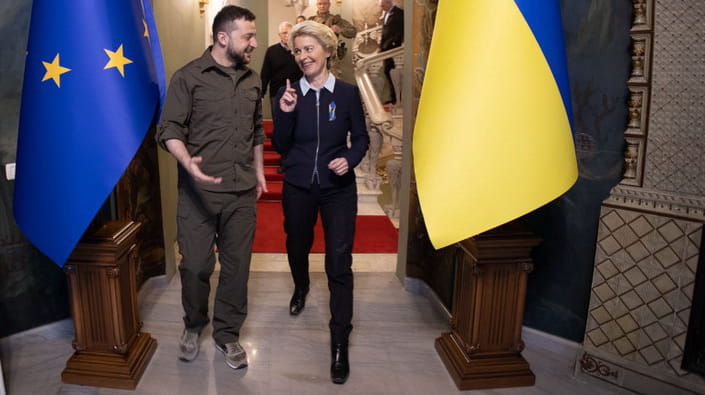EU Plans Hundred Billions for "Rebuild Ukraine", but Issues Remain

'Rebuild Ukraine' is the new tool for the reconstruction of Ukraine after the end of the war with Russia.
The European Commission announced only the concept of this tool on May 18. It is just a concept because no one still knows the amount of aid and where these funds should be directed.
According to the document, since "Russia's aggression continues, the overall needs for the reconstruction of Ukraine are not yet known." The European Commission only estimates that these needs will amount to hundreds of billions of euros, and it may take more than a decade to fully recover.
The EU outlined how it plans to organize assistance to Ukraine and what steps it expects from Kyiv in response.
So we can already start discussing whether this tool can be effective. And does it suit the Ukrainian authorities (spoiler - not really)?
Hint of EU Membership
Grants, loans, and investments should be the key options for the project 'Rebuild Ukraine.'
As the European Commission promises, the project "would build on the EU's experience under the Recovery and Resilience Facility, but adapted to the unprecedented challenges of reconstructing Ukraine and accompanying it on its European path."
This experience, Brussels hopes, "ensures the transparency, accountability and sound financial management of this initiative, with a clear link to investments and reforms."
Funds should be allocated by the European Union itself as well "as G7 and G20 partners, and other third countries, as well as international financial institutions and international organizations."
Meanwhile, the European Commission does not rule out that "frozen Russian assets" (the property of Russian or Belarusian individuals and companies subject to EU sanctions) may be used to finance part of the costs.
As the European Commission predicts, Ukraine should develop the recovery plan itself, but it will be approved by a special body - ‘The Ukraine reconstruction platform.'
Ukraine will determine its needs and carry out rebuilding, but a special EU body must approve and monitor all these plans.
Economists interviewed by EuroPravda say that the project published by the European Commission is still very crude, and many crucial points remain unknown. It makes it impossible to analyze the EU proposals today.
The unequivocal positive is that the EU understands that the reconstruction of Ukraine will require hundreds of billions. They write about it directly. However, it all depends on the correlation between non-repayable grants, loans, and investments from private business," says Olexandra Betlii, an expert at the Institute for Economic Research and Policy Consulting.
She reminds us that in the 'original' Marshall Plan, the share of grants reached 80%.
"This is the best option for Ukraine. However, Ukraine also cannot afford to borrow such amounts. It could be a loan similar to a new IMF product - for 20 years without interest in the first decade. After the war, having a crazy neighbor, Ukraine will not be easy to count on investment inflows. It will only be possible if the EU agrees to insure them", convinced Betlii.
Vitalii Vavryshchuk, Head of the ICU Macroeconomic Research Department, draws attention to two other highlights of this document.
"They do not mention it directly, but the plan is developed in such a way that Ukraine will soon receive the status of a candidate for EU membership. Therefore, they see no reason to separate recovery plans from membership preparation programs," he said.
Vavryshchuk also draws attention to the fact that the EU document assumes the authority to control the implementation of projects, funding for which will be attracted from other sources.
Money for Reforms
Another crucial point: will Ukraine get additional conditions for these funds?
The European Commission makes it clear that "a significant emphasis will be put on the rule of law reforms and fight against corruption, whilst investments, brought in line with climate, environmental and digital EU policies and standards, will help Ukraine emerge stronger and more resilient from the devastation of the Russian invasion."
"This is a very specific answer. The EU is ready to provide aid only after reforms," Betlii summed up.
Such a condition may provoke criticism from the Ukrainian authorities.
Advisor to President Volodymyr Zelensky, Oleh Ustenko, notes that we should distinguish between infrastructure rebuilding projects and reform projects.
The president's position is that infrastructure rebuilding projects should be implemented as soon as possible. People who have lost their homes do not have ten years to wait. We also assume there is no point in simply rebuilding. The new dwellings must be modern and energy-efficient, which will simultaneously solve other problems of Ukraine," he said.
Ustenko is convinced that funding of the infrastructure projects should not be accompanied by additional conditions from the European Commission.
Oleh Ustenko adds that current Ukraine's direct losses from Russian aggression are estimated at $650 billion, and indirect losses could reach $1 trillion.
"This is an unaffordable amount for Ukraine. We count on the frozen assets from both the Russian central bank and Russian oligarchs. In total, we can raise about $500 billion, which we can quickly spend on rebuilding Ukrainian infrastructure," Ustenko said.
The condition of "money for reforms," Ustenko finds it acceptable.
"We will soon receive the status of a candidate for EU membership. No doubts about that. The Ukrainian reforms will change completely. They must be aimed at the accession to the EU," added the Advisor of Zelensky.
* * * * *
The concept of 'Rebuilding Ukraine' by the European Commission will still undergo many changes. Some Kyiv will have to submit after receiving the EU candidate status, and some will change after consultation with other donors and the Ukrainian authorities.
However, this concept signals what steps the EU is ready to take and what it expects from Ukraine.
Yurii Panchenko,
Editor of "European Pravda"